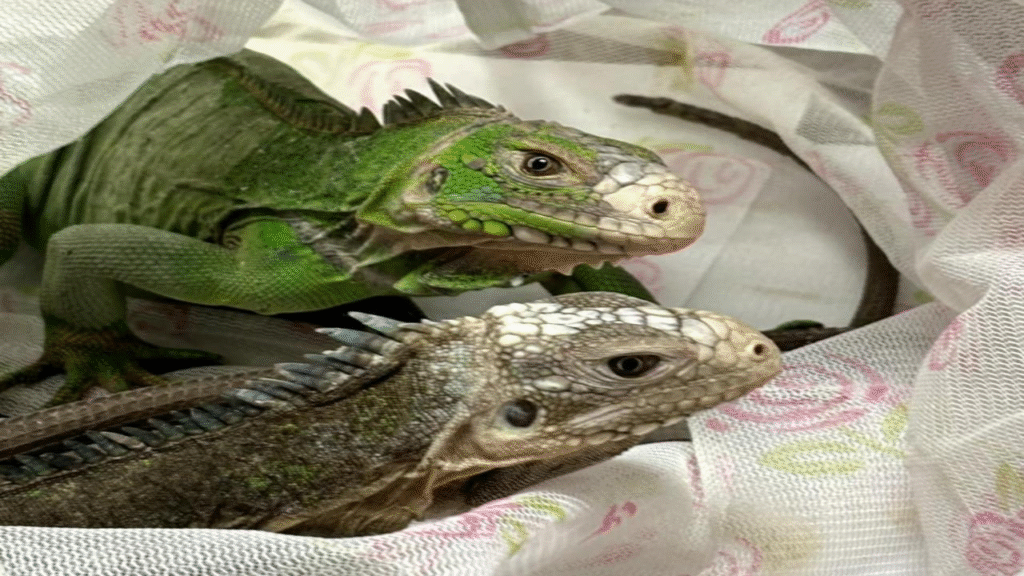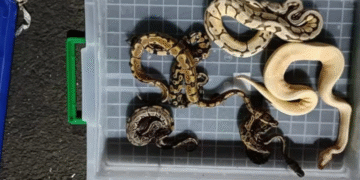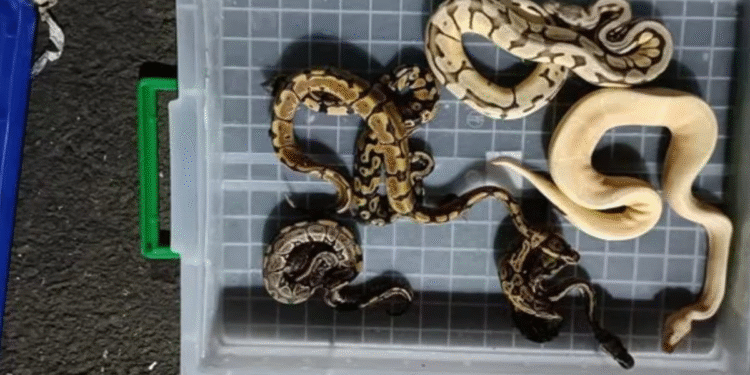At Mumbai’s international airport, customs officials intercepted a Thane-based woman carrying 154 exotic animals — including baby anacondas, iguanas, lizards and raccoons — concealed in plastic containers in her luggage. The seizure, involving species protected under both the Convention on International Trade in Endangered Species of Wild Fauna and Flora (CITES) and India’s Wildlife (Protection) Act, 1972, has led to charges under both the Customs Act, 1962 and the Wildlife Protection Act
Mumbai, 23 October 2025
In a major crackdown on wildlife trafficking, officials at Chhatrapati Shivaji Maharaj International Airport (Mumbai) intercepted a consignment of 154 exotic animals, including baby anacondas, iguanas, turtles, lizards, bearded dragons and raccoons. A woman from Thane has been arrested in the operation.
The Seizure: What Was Found
Customs officers conducted an examination after suspecting irregularities in the baggage of a Thane-based female passenger arriving at the airport. Upon inspection, officials discovered a large number of live animals concealed inside plastic containers within her luggage. The haul included:
- Baby anacondas.
- Iguanas, bearded dragons, and various lizards.
- Tortoises, turtles and raccoons.
The animals are reported to be from species protected under the Convention on International Trade in Endangered Species of Wild Fauna and Flora (CITES) and under India’s Wildlife (Protection) Act, 1972.

Rescue and rehabilitation teams from the NGO Resqink Association for Wildlife Welfare (RAWW) were called in to provide urgent medical attention to the animals and to stabilise their condition.
The Accused & Legal Action
The woman from Thane has been booked under the provisions of the Customs Act, 1962 and the Wildlife (Protection) Act, 1972.
Officials are investigating whether she was acting alone or as part of a wider trafficking ring. Given the volume and variety of the animals seized, authorities believe the operation may be part of a broader network smuggling exotic wildlife into India.
Why This Matters
The incident sheds light on several serious issues:
- Wildlife Trafficking Routes
India is increasingly becoming a destination for exotic wildlife smuggling — many creatures are flown in from Southeast Asia, particularly Thailand, concealed in luggage or cargo to meet pet-trade demand. - Threat to Endangered Species
Many species of reptiles, amphibians and exotic mammals are listed under CITES and are protected by Indian law. Illegal trade not only jeopardises global biodiversity but also threatens the survival of vulnerable wild populations. - Mistreatment of Animals
The animals were reportedly packed in plastic containers, deprived of appropriate care, and transported in inhumane conditions. The physical and mental trauma to these creatures is severe. - Complex Enforcement Challenge
The interplay between customs, wildlife crime units, NGOs and international law-enforcement highlights the complexity of addressing smuggling. The case will require forensic tracing, international cooperation, asset tracking, and wildlife rescue logistics.

Behind the Scenes: How the Smuggling Happens
Although this particular case is still under investigation, based on past patterns the typical process involves:
- Acquiring exotic or rare animals (often wild-caught) from source countries (e.g., Thailand, Malaysia, Indonesia).
- Concealing them in luggage, crates, boxes or as part of regular cargo shipments, often labelled as “fish”, “pets”, “zoo specimens” etc.
- Using transit hubs like Bangkok to dispatch the animals and exploiting flights into India where customs checks may be less rigorous.
- Once in India, animals may be sold in the exotic-pets market, used in illegal collections, or further smuggled to final buyers.
In this instance, the woman’s luggage was flagged by customs officials and the inspection revealed the concealed animals. The swift action prevented this consignment from entering the domestic market.
The Rescue Operation
Rescue teams from RAWW were called to stabilise the seized animals. Veterinary care, quarantine protocols and assessment of their origin are crucial. The animals will not simply be released into the wild; many may be repatriated, or if release is impossible, housed in rescue/rehabilitation facilities.
Authorities have indicated that the animals will be deported to their country of origin, in compliance with CITES norms and Indian regulations.
What’s Next?
- Further Investigation: The customs & wildlife crime units will trace the supply chain: where the animals were sourced, how the logistic chain operated, and who the end-buyers were.
- Asset Tracking: If the trafficking ring is found to be operating as a criminal enterprise, asset seizure, money-laundering investigations and stronger punitive action may follow.
- Policy Implications: Authorities might implement tighter controls at airports — including increased screening of passengers arriving from high-risk origins, enhanced canine/biometric checks for wildlife smuggling.
- Public Awareness: Disseminating information on the legal and ethical issues of exotic pet trade, discouraging demand for illegally-trafficked wildlife.
The Broader Picture: India’s Role in Wildlife Trafficking
India has become one of the key points of transit or destination for many exotic wildlife smuggling operations. Several recent seizures highlight an escalating trend:
- A case where over 7,000 animals were intercepted on the Thailand-India route.
- Another seizure of 60 exotic animals at Mumbai airport with passenger arriving from Bangkok.
- A gang based in Chennai allegedly supplying exotic wildlife to Mumbai-based markets.
These point to well-organised networks exploiting legal loopholes, weak enforcement at transit points, and high domestic demand for exotic pets.
Human Dimension & Ethical Concerns
For many of the trafficked animals:
- Their natural ecosystems have been ripped away; survival in captivity is fraught with stress, disease, malnutrition and deaths.
- Smuggling often results in high mortality rates during transport.
- The exotic-pet trade fuels more poaching and ecosystem destabilisation in source countries.
- Beyond law-breaking, this also raises significant ethical and conservation-concerns.
How Can Society and Individuals Help?
- Avoid purchasing exotic pets unless from credible, legal sources with full documentation. Demand drives supply.
- Report suspicious behaviour: If you notice someone transporting animals under odd conditions, or promoting rare wildlife trade, contact wildlife crime control authorities.
- Support rescue & rehabilitation NGOs, which play a critical role in stabilising and repatriating trafficked animals.
- Promote education on conservation: Understanding that wildlife belongs in the wild, not in illegal captivity or under pet-market demand.
- Advocate for stronger policies and enforcement: As these kinds of seizures illustrate, border-control is critical, but so is domestic regulation of exotic-pet ownership.
In Summary
This seizure of 154 exotic animals at Mumbai airport and the arrest of a Thane woman underscore the depth of the wildlife-trafficking problem — from source countries in Southeast Asia to transit hubs and domestic markets. While the immediate operation has been foiled, the challenge remains: disrupting the supply chains, eradicating demand for illegally-trafficked wildlife, and strengthening the protective web of laws, enforcement, and public awareness.
The incident serves as a wake-up call: behind each smuggled creature is a story of ecological disruption, legal violation and moral transgression.
Also Read : Who is Mumbai-based Lavish, drug lord’s right-hand man deported from Dubai?















 Categories
Categories









